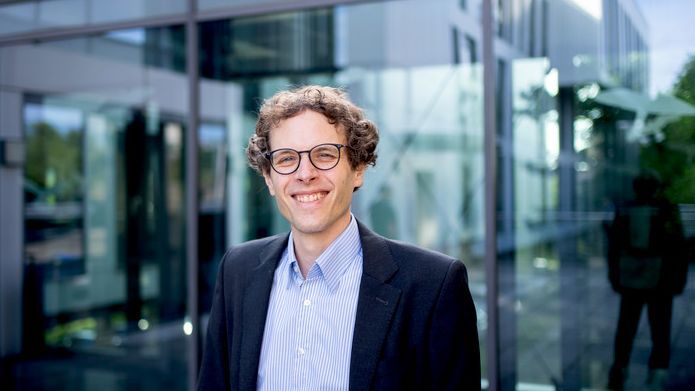Axel Bücher has held the professorship for mathematical statistics at the Ruhr University Bochum since October 1, 2023. He remembers that his passion for this topic began almost exactly 20 years earlier - also at the Ruhr University in Bochum.
Here he attended the basic lecture of his later doctoral supervisor Holger Dette. “He transferred his enthusiasm for mathematics and statistics to me in this lecture,” says Axel Bücher. With his appointment to Bochum, the circle has now come full circle. Just a few days after Bücher arrived at the Ruhr University, he was sitting with Holger Dette to plan the next research collaboration.
But statistician Axel Bücher is also interested in cross-disciplinary collaborations. For example, he is involved in the “ClimXtreme” project, which is funded by the Federal Ministry of Education and Research. Together with colleagues from application-oriented disciplines, he is researching how extreme weather events can be better assessed. Heat, heavy rain, drought, hailstorms – how likely are these phenomena today compared to before? What contribution does climate change have to these climate extremes?
Finding the optimal statistical procedures
Extreme value statistics help answer these questions. It is particularly useful in areas where there is relatively little measurement data and therefore uncertainty. Books is an expert in finding out which statistical methods are best suited to which problem. He also examines which substeps in the calculations can be improved in order to achieve more reliable results. The mathematician can also be enthusiastic about abstract theoretical questions. But: “The application focus enriches my work,” he says. “Projects like ClimXtreme help me explain why what I do is important.”
From hardcore math publication to cooperation with the weather service
As with many interdisciplinary collaborations, the collaboration between theorists and applied disciplines often takes a little getting started. “We first have to find a common language,” says Bücher. “ClimXtreme initially resulted in a highly mathematical publication that was initially not easily accessible to many members of the project team. Over time, however, the topics covered became increasingly more practical.”
For example, in cooperation with the German Weather Service, Axel Bücher helped to calculate how likely heavy precipitation is on the Ahr and Erft today compared to 100 years ago. “Not even that much more likely,” he reveals the result. In other regions or during other extreme weather events, for example at maximum summer temperatures, things looked different. “We see a very strong signal here,” says Bücher. “In some areas temperatures were measured that were previously almost impossible.”
The second funding phase of ClimXtreme has just started. Axel Bücher and his project partners now have three years to get to the bottom of the probabilities of extreme weather events - and the cooperation between the disciplines is now well established.
To person
Axel Bücher studied mathematics at the Ruhr University in Bochum, where he also completed his doctorate in statistics in 2011. He then moved to the Belgian Université catholique de Louvain as a postdoctoral researcher before taking up two substitute professorships at the University of Heidelberg and the Technical University of Dortmund. From 2018, Bücher worked as a professor of mathematical statistics at the Heinrich Heine University in Düsseldorf. In 2023 he accepted a professorship of the same name at the Ruhr University in Bochum.
